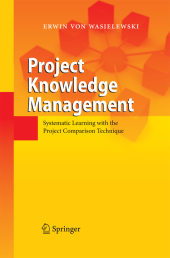 Neuerscheinungen 2014Stand: 2020-02-01 |
Schnellsuche
ISBN/Stichwort/Autor
|
Herderstraße 10
10625 Berlin
Tel.: 030 315 714 16
Fax 030 315 714 14
info@buchspektrum.de |

Erwin von Wasielewski
Project Knowledge Management
Systematic Learning with the Project Comparison Technique
2010. 2014. xiv, 175 S. 235 mm
Verlag/Jahr: SPRINGER, BERLIN; SPRINGER BERLIN HEIDELBERG 2014
ISBN: 3-642-43319-7 (3642433197)
Neue ISBN: 978-3-642-43319-1 (9783642433191)
Preis und Lieferzeit: Bitte klicken
This is the first English book on Project Comparison Technique. It facilitates the first steps towards project comparisons for project management experts and scientists. It also details possible approaches and relates real-world experiences.
The publication of this book Project Knowledge Management Systematic Lea- ing with the Project Comparison Technique by Erwin v. Wasielewski lls me with a special joy. It is a translation of the author s German book Projektvergleic- technik which I edited in 2003 in the GPM Deutsche Gesellschaft fur Proje- management e.V. series in Germany. I have closely watched the author s work on Project ComparisonTechnique since his rst publicationin 1978, and I have always admired the analytical exactness of his investigations. Unfortunately, as I have to admit in retrospect, v. Wasielewski s ideas were too far advanced. Maybe the fact that parametric analyseswere rarely used in Germanyalso hinderedthe propagation of the method at the time. Duringthe 1970sand early1980s,there was notalk about projectcharacteristics, project benchmarking, or project evaluation. The only exception was an evaluation model presented by Bruce Baker in 1979 during the world congress in Garmisch- Partenkirchen,but this can hardlybe comparedto the approachin this book.Almost nobody re ected on evaluation of project experiences, although in the USA for several years cost data of completed projects were being used to get parametric estimation equations. A chapter Project Close-out did not yet exist, and even later was to be found only in advanced technical literature.
Theory.- Breakdown of Project Objective.- Partial Comparison.- to Terminology.- Total Comparison.- Comparison Typology.- Correction for Cost, Price, and Working-Time Index.- Mathematical Issues of Partial Comparisons.- Application.- 177 Projects as an Example.- Collecting, Keeping, and Processing Data.- Total Comparison of all 177 Projects.- Utilization.- Presenting Comparison Results.- Application Issues.- Specialized Prognosis Methods for some Base-Goals.- A Software Tool for Simple Project Comparisons.- Approaching Success Characteristics.


